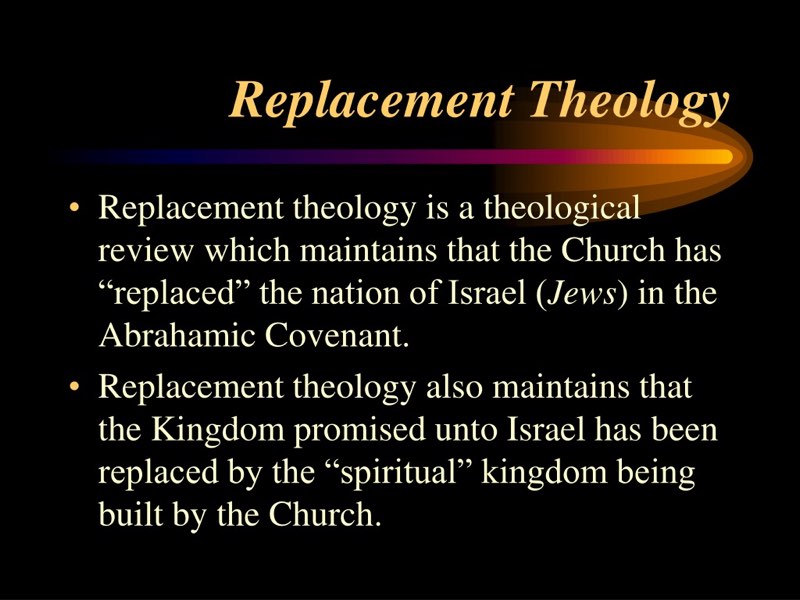Replacement theology
Replacement theology, also known as supersessionism, is a theological framework that asserts the Christian Church has replaced Israel as God's chosen people, inheriting all the promises and blessings of the Old Testament. This essay aims to explore the origins of replacement theology, its evolution throughout history, and its contemporary relevance within the Christian faith.
Origins of Replacement Theology:
The roots of replacement theology can be traced back to the early Christian Church, particularly the writings of the Church Fathers such as Justin Martyr, Tertullian, and Origen. These early theologians interpreted the destruction of Jerusalem and the Temple in 70 AD as a divine punishment for the Jews' rejection of Jesus as the Messiah. Consequently, they argued that God had rejected Israel as His chosen people, transferring His favor to the Church.
Evolution of Replacement Theology:
Replacement theology gained prominence during the Middle Ages, primarily due to the influence of Augustine of Hippo. Augustine argued that the Jewish people were eternally condemned for their role in Jesus' crucifixion, emphasizing their spiritual blindness and inherent guilt. This theological view was further reinforced by the rise of Christianity as the official religion of the Roman Empire, leading to the marginalization and persecution of Jews throughout Europe.
However, during the Reformation, Martin Luther challenged certain aspects of replacement theology. While Luther initially expressed sympathy for the Jewish people's plight, his later writings contained anti Semitic sentiments, blaming them for their rejection of Christ and advocating for their expulsion. This ambivalence towards Jews persisted in various Protestant traditions and influenced subsequent interpretations of replacement theology.
Contemporary Relevance:
In recent years, replacement theology has faced significant criticism and revision from within the Christian community. Many theologians and churches have acknowledged the harmful consequences of this theological framework, particularly its role in fostering anti Semitism and perpetuating harmful stereotypes. Consequently, there has been a growing movement towards a more inclusive understanding of God's covenant with Israel and the Jewish people.
Moreover, interfaith dialogue and the recognition of the shared religious heritage between Christians and Jews have contributed to a reevaluation of replacement theology. Many Christians now recognize the significance of the Jewish faith and acknowledge the ongoing importance of God's covenant with Israel. This shift in perspective has led to a more nuanced understanding of the relationship between Christianity and Judaism, emphasizing mutual respect and cooperation.
Conclusion:
Replacement theology has had a profound impact on Christian-Jewish relations throughout history. Its origins in the early Church, evolution during the Middle Ages, and contemporary relevance highlight the changing interpretations and understandings of this theological framework. While replacement theology has faced criticism for its negative consequences, recent developments within Christianity have paved the way for a more inclusive and respectful approach towards the Jewish people and their faith. As Christians continue to engage in interfaith dialogue and reevaluate their theological beliefs, the significance and relevance of replacement theology will undoubtedly undergo further transformation.


